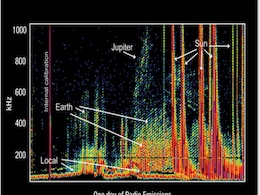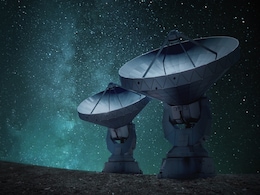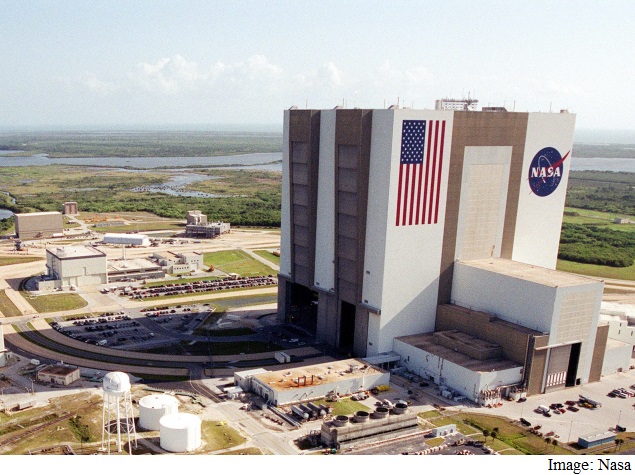Space Telescope Science Institute
- All
- News
-

NASA SPHEREx Mission to Map Water Ice in the Milky Way for Life’s Origins
- Monday February 17, 2025
- Written by Gadgets 360 Staff
NASA’s SPHEREx mission, launching February 27, will search for water ice and frozen compounds in the Milky Way’s molecular clouds. By surveying over 9 million regions, the mission aims to understand how these compounds influence planet and star formation. Findings will complement data from the James Webb Space Telescope, enhancing insights into...
-
 www.gadgets360.com
www.gadgets360.com
-

Scientists Scan TRAPPIST-1 for Interplanetary Radio Signal Using Allen Telescope Array
- Friday October 18, 2024
- Written by Gadgets 360 Staff
Scientists at Penn State and the SETI Institute have developed a new method to search for interplanetary radio signals from planets in the TRAPPIST-1 system. Using the Allen Telescope Array, they scanned this system for nearly 28 hours but did not find evidence of alien communication. This project, however, has introduced a new way of detecting pot...
-
 www.gadgets360.com
www.gadgets360.com
-

Elon Musk’s Starlink Satellites Could Severely Damage Ground-Based Radio Telescopes, Says Study
- Saturday September 21, 2024
- Written by Gadgets 360 Staff
Elon Musk's Starlink satellites are causing significant disruption for astronomers worldwide. Scientists from the Netherlands, particularly the Netherlands Institute for Radio Astronomy (ASTRON), have reported that the growing network of Starlink satellites is interfering with radio waves used for vital space research. The satellites, designed to p...
-
 www.gadgets360.com
www.gadgets360.com
-

Most Earth-Like Worlds Yet to be Born: Scientists
- Wednesday October 21, 2015
- World News | Indo-Asian News Service
There should at least be one billion Earth-sized worlds in the Milky Way galaxy at present, scientists have theorised, adding that in the entire universe, bulk of life-supporting planets -- 92 per cent -- are yet to be born.
-
 www.ndtv.com
www.ndtv.com
-

India to Provide Software, Mirrors for Largest-Ever Telescope
- Sunday December 14, 2014
- India News | Press Trust of India
India will provide software, vital mirrors and control systems to build the "largest-ever" telescope as part of a global project involving the United States, Canada, China and Japan.
-
 www.ndtv.com
www.ndtv.com
-
NASA to take you ten times farther into our galaxy
- Friday April 11, 2014
- World News | Indo-Asian News Service
Applying a novel technique that can yield new insight into dark energy in space, astronomers can now precisely measure the distance of stars up to 10,000 light-years away - 10 times farther than previously possible.
-
 www.ndtv.com
www.ndtv.com
-
NASA begins deepest ever probe of the universe
- Sunday October 27, 2013
- World News | Press Trust of India
NASA's Hubble, Spitzer and Chandra space telescopes are teaming up to look deeper into the universe than ever before and search for the most distant and faint galaxies that can possibly be seen.
-
 www.ndtv.com
www.ndtv.com
-

NASA SPHEREx Mission to Map Water Ice in the Milky Way for Life’s Origins
- Monday February 17, 2025
- Written by Gadgets 360 Staff
NASA’s SPHEREx mission, launching February 27, will search for water ice and frozen compounds in the Milky Way’s molecular clouds. By surveying over 9 million regions, the mission aims to understand how these compounds influence planet and star formation. Findings will complement data from the James Webb Space Telescope, enhancing insights into...
-
 www.gadgets360.com
www.gadgets360.com
-

Scientists Scan TRAPPIST-1 for Interplanetary Radio Signal Using Allen Telescope Array
- Friday October 18, 2024
- Written by Gadgets 360 Staff
Scientists at Penn State and the SETI Institute have developed a new method to search for interplanetary radio signals from planets in the TRAPPIST-1 system. Using the Allen Telescope Array, they scanned this system for nearly 28 hours but did not find evidence of alien communication. This project, however, has introduced a new way of detecting pot...
-
 www.gadgets360.com
www.gadgets360.com
-

Elon Musk’s Starlink Satellites Could Severely Damage Ground-Based Radio Telescopes, Says Study
- Saturday September 21, 2024
- Written by Gadgets 360 Staff
Elon Musk's Starlink satellites are causing significant disruption for astronomers worldwide. Scientists from the Netherlands, particularly the Netherlands Institute for Radio Astronomy (ASTRON), have reported that the growing network of Starlink satellites is interfering with radio waves used for vital space research. The satellites, designed to p...
-
 www.gadgets360.com
www.gadgets360.com
-

Most Earth-Like Worlds Yet to be Born: Scientists
- Wednesday October 21, 2015
- World News | Indo-Asian News Service
There should at least be one billion Earth-sized worlds in the Milky Way galaxy at present, scientists have theorised, adding that in the entire universe, bulk of life-supporting planets -- 92 per cent -- are yet to be born.
-
 www.ndtv.com
www.ndtv.com
-

India to Provide Software, Mirrors for Largest-Ever Telescope
- Sunday December 14, 2014
- India News | Press Trust of India
India will provide software, vital mirrors and control systems to build the "largest-ever" telescope as part of a global project involving the United States, Canada, China and Japan.
-
 www.ndtv.com
www.ndtv.com
-
NASA to take you ten times farther into our galaxy
- Friday April 11, 2014
- World News | Indo-Asian News Service
Applying a novel technique that can yield new insight into dark energy in space, astronomers can now precisely measure the distance of stars up to 10,000 light-years away - 10 times farther than previously possible.
-
 www.ndtv.com
www.ndtv.com
-
NASA begins deepest ever probe of the universe
- Sunday October 27, 2013
- World News | Press Trust of India
NASA's Hubble, Spitzer and Chandra space telescopes are teaming up to look deeper into the universe than ever before and search for the most distant and faint galaxies that can possibly be seen.
-
 www.ndtv.com
www.ndtv.com







